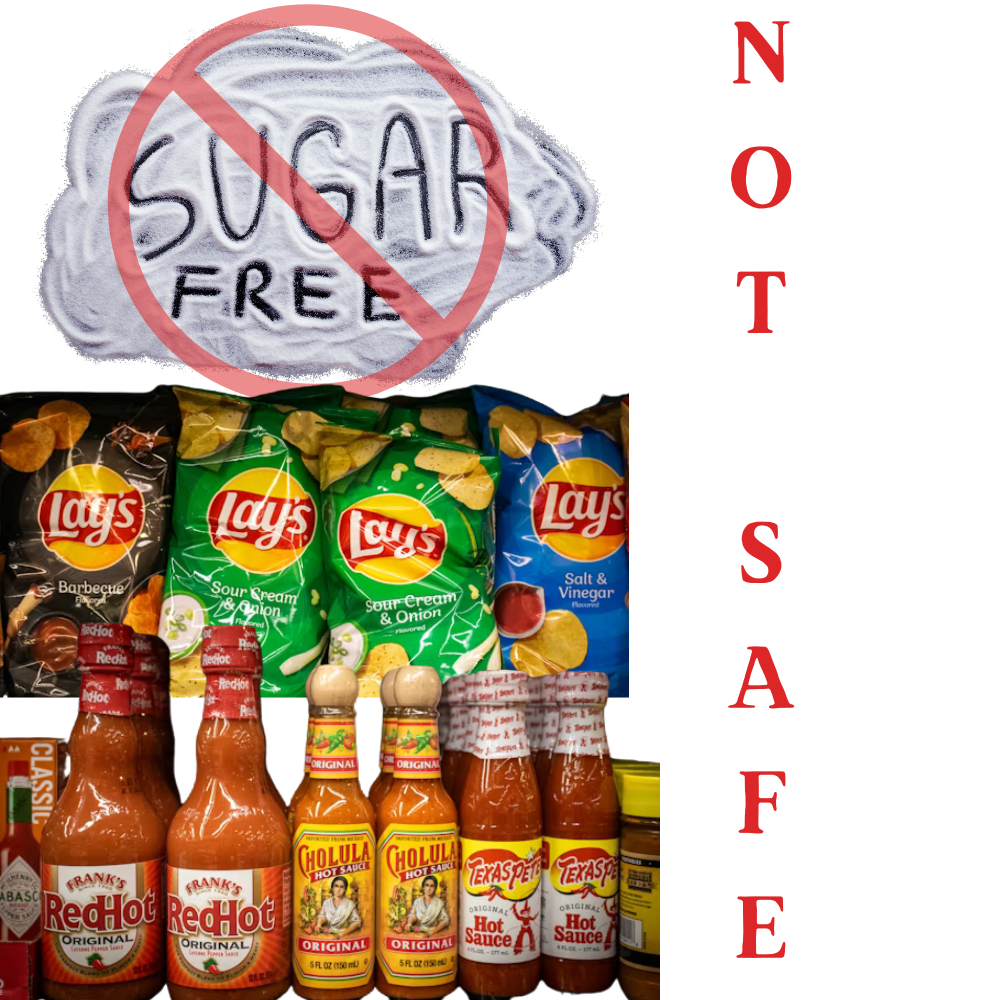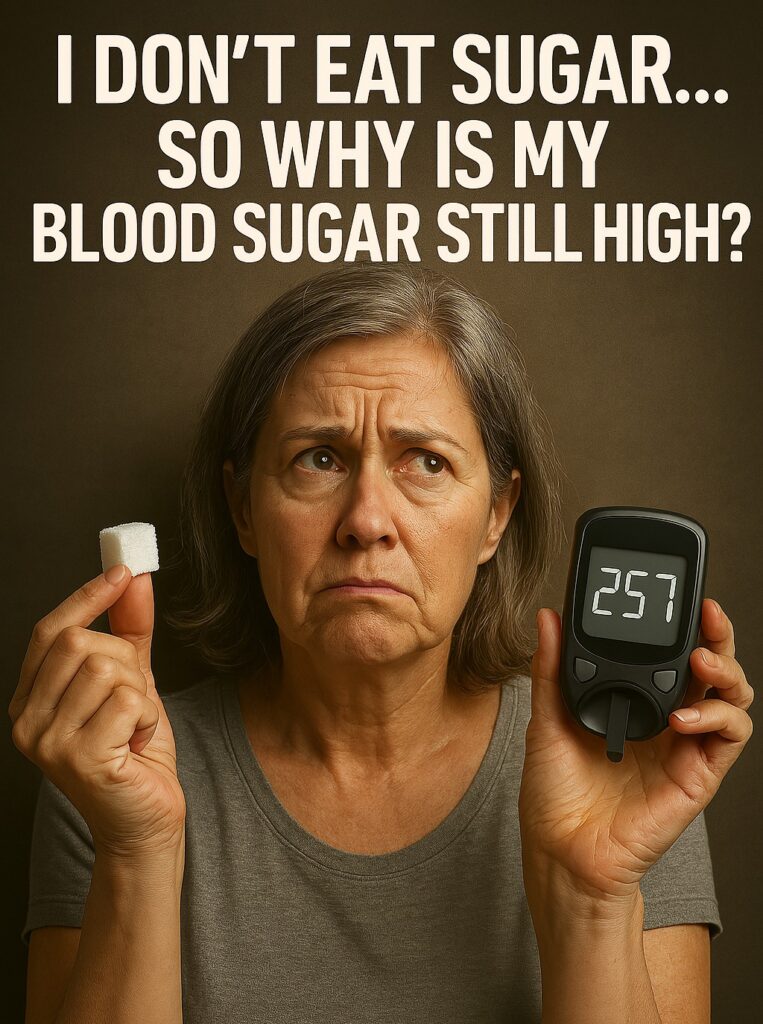Beyond Sugar: The Everyday Carbs Spiking Your Blood Sugar
Table of Contents
The Science Behind Carbs and Glucose
Many people believe, “If I stop eating sugar, my blood sugar should be normal.”
But it’s not that simple.

Sugar is not the only thing that raises your blood sugar levels. In fact, even if you avoid sweets, your sugar can still remain high. Why? Because many foods that don’t taste sweet still turn into sugar inside your body.
Here’s how it works:
Whenever you eat carbohydrates — like rice, roti, bread, pasta, or even fruits — your body breaks them down into glucose (a type of sugar). This glucose goes into your blood and raises your sugar levels.

There are two types of carbs:
- Simple carbs: Found in sweets, sugary drinks, white bread, etc. They raise blood sugar quickly.
- Complex carbs: Found in whole grains, pulses, and vegetables. They raise sugar more slowly and are healthier in small portions.
So even if you stop eating sugar, your blood sugar can still go up because of other carbs in your meals. On top of that, other factors like stress, poor sleep, hormonal changes, certain medicines, and skipping meals can also affect your sugar levels.
In the next sections, we’ll explain how all these factors play a role — and what you can do to manage your blood sugar better.
Hidden Carbs in Everyday Foods
You may be avoiding sweets, but did you know many common foods in our daily meals can still raise your blood sugar?
Foods like white rice, roti, bread, and pasta are full of carbs. They don’t taste sweet, but once eaten, they break down into sugar in your body. Other starchy foods like potatoes, corn, and peas can also push your sugar levels up quickly.

Even fruits can sometimes be tricky. Some fruits like bananas, mangoes, grapes, and fruit juices have a high glycemic index (GI) — which means they raise blood sugar faster than low-GI foods.

Packaged foods are another trap. Many snacks, sauces, energy bars, and even diet drinks contain hidden carbs and starches. Even if the packet says “sugar-free,” it doesn’t always mean it’s safe. These products may still have other sweeteners or carbs that affect your sugar levels.

This is why it’s important to know about the glycemic index — a way to measure how fast a food increases blood sugar. High-GI foods increase sugar quickly, while low-GI foods are better for steady sugar levels.
So next time, don’t just check for “sugar” — look at total carbs. Read food labels carefully, and try to choose whole grains, fiber-rich options, and natural foods over processed ones.
Small changes can make a big difference.
Fasting, Skipping Meals & The Dawn Phenomenon

Many people think that skipping meals or fasting will lower blood sugar. But in some cases, it can actually do the opposite.
When you fast for too long or skip meals, your body may release stored sugar into the blood to give you energy. This can lead to fasting hyperglycemia, where your blood sugar is high even without eating anything.
Another reason for morning sugar spikes is the dawn phenomenon. In the early hours (between 4 AM to 8 AM), your body releases hormones like cortisol to wake you up. These hormones also raise your blood sugar — even if you haven’t eaten yet.
So, if your sugar is high in the morning or after long gaps between meals, fasting may be the reason, not food.
Stress, Sleep & Hormonal Imbalances
Even if you don’t eat sugar, stress and poor sleep can cause your blood sugar to rise. When you’re stressed, your body releases hormones like cortisol and adrenaline. These hormones tell your liver to release more sugar into your blood for quick energy — which can lead to high sugar levels.


Some health conditions like PCOS (Polycystic Ovary Syndrome), thyroid problems, and menopause also create hormone imbalances. These changes can make it difficult for your body to manage blood sugar levels, even if your diet is under control.
So, it’s not just what you eat — your stress, sleep, and hormones also play a big role in keeping your sugar levels in check.
Lack of Physical Activity & Muscle Engagement


If you don’t move your body enough, your blood sugar can go up — even if you don’t eat sugar. This happens because your body becomes less sensitive to insulin, the hormone that helps control sugar levels. This condition is called insulin resistance.
When you’re inactive, your muscles don’t use much glucose, so it stays in your blood. But when you walk, exercise, or do even small physical activities like cleaning or climbing stairs, your muscles absorb glucose for energy. This helps lower your blood sugar naturally.
You don’t have to go to the gym every day. Even a 20–30 minute walk, stretching, or yoga can help. Doing regular movement also improves your mood, reduces stress, and helps with better sleep — all of which support better sugar control.
So remember, sitting too much is not just bad for your back — it’s also bad for your sugar levels. Keep moving, and your body will manage sugar much better.
Medications, Inflammation & Organ Health
Sometimes, even if you don’t eat sugar, your blood sugar can go up because of medicines. Certain medications like steroids, antidepressants, birth control pills, and some allergy or asthma medicines can raise blood sugar as a side effect. If you’re taking any long-term medication, it’s good to talk to your doctor about its impact on sugar levels.

Your organs also play a big role in controlling sugar. The pancreas produces insulin — the hormone that helps sugar move from your blood into your cells. If the pancreas doesn’t work well, sugar builds up in the blood.
A fatty liver (common in many people) can also cause problems with sugar control. The liver helps store and release sugar — but when it’s filled with fat, it can’t do this properly.
Even your gut health matters. A poor digestive system or bad gut bacteria can affect how your body handles sugar and absorbs nutrients.
So, it’s not just about what you eat — your medicines, liver, pancreas, and even your gut can silently affect your sugar levels. Always keep your doctor informed about your health and medications.
Smarter Lifestyle Choices That Help

Managing blood sugar isn’t just about avoiding sweets — it’s about watching your total carbohydrate intake. Even foods that don’t taste sweet, like rice, roti, or poha, can raise your sugar if eaten in large amounts.
Start by reading food labels. Look for “total carbohydrates” — not just sugar. Many “sugar-free” items still have hidden carbs. Also, be careful with portion sizes. Even healthy foods can spike sugar if you eat too much.
Choose foods that are low on the glycemic index (GI). These are digested slowly and don’t cause sudden sugar spikes. For example, whole grains, dals, vegetables, nuts, and seeds are good options. Also, fiber-rich foods like oats, fruits with skin, and vegetables help control sugar levels.
Try to pair your carbs with protein or healthy fats. For example, eat chapati with dal or curd, or pair a fruit with some nuts. This helps slow down digestion and keeps sugar steady.
Small changes in how and what you eat can make a big difference. A balanced plate is better than just avoiding sugar.
Explore More Relevant Blogs
Want to learn more about how food, habits, and health affect your sugar levels? Check out these helpful blogs:
- Reversing PCOS: A Comprehensive Guide to Managing Polycystic Ovary Syndrome
- IS INTERMITTENT FASTING THE SECRET WEAPON FOR DIABETES REVERSAL
- IS STRESS DEFEATING YOUR DIABETES TREATMENT? HERE’S THE FIX!
- Sugar Addiction in Children
- Why Checking Only Fasting Blood Sugar is Not Enough for Diabetes Management
Each blog is written in easy words and gives simple tips for better sugar control.
Contact Us to Know More
Still confused about why your blood sugar is high even without eating sugar?
Let our experts help you with simple, science-backed solutions to manage your sugar levels.
👉 Visit us: www.redialclinic.com
📞 Call us: +91-8595426983
📱 Follow us: Instagram | Facebook | YouTube — @redialclinic
We’re here to guide you towards a healthier, happier life — one step at a time.


